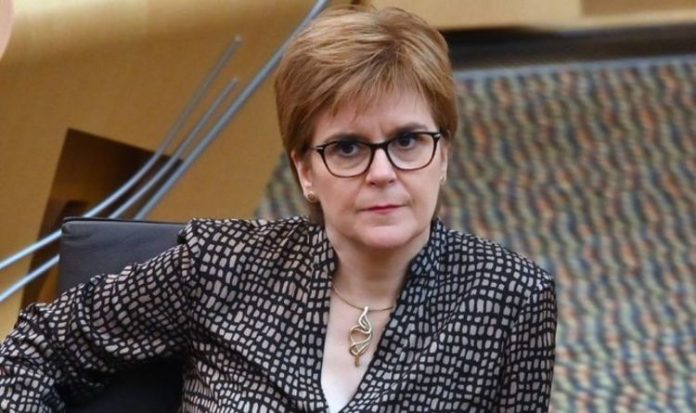Former BBC researcher and journalist Allan Little explained Nicola Sturgeon’s desire for a constitutional referendum meant her radical supporters were becoming uneasy. While the SNP leader called for an advisory referendum without Westminster’s approval, it was hoped it could be used as a mandate for a legitimate vote. However, Allan Little warned Ms Sturgeon may be too slow and cautious for her members meaning they may shift their support.
Speaking to the Insititute of European Studies, Mr Little said: “This is also why it’s so important to Nicola Sturgeon to do (independence) legally and constitutionally and why it’s so important to her to have an Article 30 order from Westminster.
“It’s so it can be done in consensus with Westminster and she’s under increasing pressure.
“There’s a split in the SNP, which has become very bitter in recent months.
“Many on the more radical wing seeing her as too cautious, too constitutional, too willing to wait for Westminster’s approval before pressing ahead with a second referendum.
JUST IN: Nicola Sturgeon re-election at risk as new poll indicates a drop in SNP popularity
“But she knows what happened in Catalonia and she keeps reminding her more impatient SNP members that although they went ahead with a referendum it didn’t deliver independence.”
He continued: “And so she wants to do it constitutionally and that is now getting her into more and more trouble with more radical wings of her party.
“She wants to be able to go to European capitals and say we did this under the authority of the United Kingdom constitution and we agreed the process with London and we all agreed to recognise the outcome.
“And as long as Westminster continues to hold out and Boris Johnson insist there will be no second referendum.
“She’s under growing pressure to come up with a more radical plan B.”
Under the Scotland Act 1998, Scotland cannot make decisions about the unity of the UK without the approval of Westminster.
However, Article 30 can be agreed to by Westminster so that Scotland could choose to make these laws – in this case, to go independent.
Nicola Sturgeon promised that she would hold an advisory referendum if the SNP won the Scottish Parliamentary election on May 6.
DON’T MISS
However, the First Minister is currently embroiled in Alex Salmond’s inquiry which has caused conflict among some SNP supporters.
Ms Sturgeon’s decision for the referendum came after new polls suggested a majority support for Scottish independence.
But a new Survation poll suggested that only 43 percent of Scots would support independence compared to 44 percent against it.







